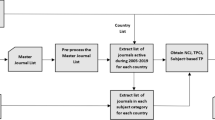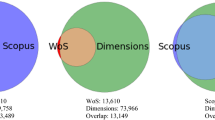Abstract
The present study attempts to find out the Research Deficit across different continents at different levels by analyzing research results published in Scopus indexed research journals from 2015 to 2019. Research deficit has been computed in terms of articles published in research journals from different continents, research articles published by researchers belonging to different continents, deficit of research journals at the continental level against the average research journals published from a continent and various other related aspects by computing differences against the average figures at the continental level. To undertake the present study, data were retrieved from SCImango for 5 years, viz., 2015 through 2019. Data upon retrieval was structured, keeping in view the objectives of the study. The scope of the study is global, as it reflects the existing research deficit across continents. In all 235 countries across the world were found actively involved in research activities. Of these, 109 (46.38%) countries were found publishing research journals actively, while the remaining 126 (53.62%) do not publish their own research journals, however these countries are active in producing research results, published in research journals across the world. Europe is the leading continent producing 35.07% to the total global research results and publishing 56.27% of the total world research journals. Of the total research results published from 2015 to 2019 across the world in Scopus indexed journals, 54.97% of research articles were published alone in the European research journals. A total of 12,352,352 research articles were published in Scopus indexed research journals from 2015 to 2019 across the world at an average of 2,058,725 articles from each continent. Given the average research articles published in research journals from each continent, Asia has research results publishing deficit of (− 27.28%), Africa (− 95.38%), Australia (− 95.18%), and South America (− 89.15%). Similarly, compared to the average research results published by researchers from their respective continents, Africa has a research deficit of (− 84.27%), Australia (− 81.07%), and South America (− 74.85%). It can inferred that research deficit of these continents is met out from the surplus research results produced by researchers from Asia, Europe, and North America. Sustainable research is essential for the growth and development of a country or for that matter, of a region. Any shortfall in a country's research activity, reflected as a research deficit is bound to hamper the growth and development of that particular country. The findings of the study strongly urge continents like Africa, South America, and Australia to improve their research output by producing more and more quality research results and by publishing more and more quality research journals to overcome their existing research deficit.
Similar content being viewed by others
References
Basu A. Does a country’s scientific ‘productivity’ depend critically on the number of country journals indexed? Scientometrics. 2010;82:507–16. https://doi.org/10.1007/s11192-010-0186-8.
Erfanmanesh M, Tahira M, Abrizah A. The publication success of 102 nations in scopus and the performance of their scopus-indexed journals. Publ Res Q. 2017;33:421–32. https://doi.org/10.1007/s12109-017-9540-5.
Larivière V, Smith MJ, Weinberger C, Bruna EM, Allesina S. The Scientific impact of nations: journal placement and citation performance. PLoS One. 2014;9:e109195. https://doi.org/10.1371/journal.pone.0109195.
Man JP, Weinkauf JG, Tsang M, Sin JHDD. Why do Some Countries publish more than others? An international comparison of research funding, english proficiency and publication output in highly ranked general medical journals. Eur J Epidemiol. 2003;19:811–7. https://doi.org/10.1023/B:EJEP.0000036571.00320.b8.
Marusic A, Marusic M. Small scientific journals from small countries: breaking from a vicious circle of inadequacy. Croat Med J. 1999;40:508–14.
Meo SA, Al-Saadi MM. Right path of publishing a scientific paper to a right journal: academic paper based case study. Pakistan Journal of Medical Sciences. 2007;23:946.
Preis T, Meo SA, Al Masri AA, Usmani AM, Memon AN, Zaidi SZ. Impact of GDP, spending on R&D, number of universities and scientific journals on research publications among Asian countries. PLoS One. 2013;8:e66449. https://doi.org/10.1371/journal.pone.0066449.
Preis T, Moat HS, Stanley HE, Bishop SR. Quantifying the advantage of looking forward. Sci Rep. 2012;2:350. https://doi.org/10.1038/srep00350.
SCImago (2020) SJR-SCImago Journal & Country Rank. http://www.scimagojr.com/. Accessed 10 July 2020.
Worldometer (2021) Asia Population. Dadax Limited. https://www.worldometers.info/world-population/asia-population/. Accessed Jan, 15 2021
Author information
Authors and Affiliations
Corresponding author
Additional information
Publisher's Note
Springer Nature remains neutral with regard to jurisdictional claims in published maps and institutional affiliations.
Rights and permissions
About this article
Cite this article
Pandita, R., Singh, S. Research Deficit Across Continents: A Study. Pub Res Q 38, 150–167 (2022). https://doi.org/10.1007/s12109-022-09865-6
Published:
Issue Date:
DOI: https://doi.org/10.1007/s12109-022-09865-6




